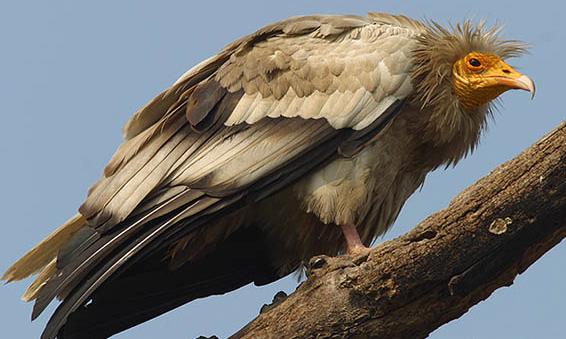Vulture - egyptian
Pharaoh's Chicken Scientific Name: Neophron percnopterus
Sat, 26th April, 2025 - 11:10 am GMT
Sponsor Ads:

Alternative Name
Pharaoh's Chicken Scientific Name: Neophron percnopterusBasic Info
The Egyptian Vulture has a thin beak compared to other Vultures. Its face is a surprisingly bright yellow, with a black-and-white body measuring from 58 to 66 centimeters. Tails of Egyptian Vultures are wedge-shaped and the wings have black tips.
Health
Egyptian Vultures should only be kept by people experienced in the care of Vultures and in close consultation with a zoo or knowledgeable veterinarian. In captivity, it is best to feed them chicks, bone meal, chunked meat, mice and a vitamin supplement. Breeding Egyptian Vultures build rough stick nests on rocky ledges or trees and may even use other birds' abandoned nests. One or two eggs are laid over a period of several days and these eggs are incubated for about 42 days. Young Egyptian Vultures are reared by both parents and do not fly until they are about 90 days old. In fact, they will not be independent until they are five to six years old!Habitat
Living in arid regions, like rocky mountains, deserts, or lowland hillsBehavior
The Egyptian Vulture is a rather unusual and interesting species of bird, with its importance in Egyptian hieroglyphics and its intelligent use of tools! Also known as Pharaoh's Chicken, the Egyptian Vulture lives in arid regions of Eurasia, migrating in summer to warm areas of Mediterranean Europe.The Egyptian Vulture uses rocks to break into the eggs, by bringing themselves up to full height and dropping the rock to crack the egg. Unfortunately, it appears that Egyptian Vultures have little to no aim, and the egg breaking may take a very long time and repeated attempts! Pharaoh's Chicken also eats insects like termites, and locusts, and occasionally dates. Small, slow mammals will also make nice meals. Egyptian Vultures nest in date palms or rocky ledges, and build messy, coarse nests of twigs or trash, basically whatever materials they can find readily. Generally, Egyptian Vultures resemble most Vultures in flight, preferring to soar with wings held straight. They hunt mostly in open country and lowlands, and their lifespan is unknown.Origin
AfricaHistory
Living in arid regions, like rocky mountains, deserts, or lowland hills, the Egyptian Vulture inhabits Southern Europe and Southwestern Asia, as well as Africa. Historically, the Pharaoh's Chicken is portrayed in Egyptian hieroglyphs, and had the sign aleph (A) modeled after their shape.Common Foods
It eats mostly carrion, but will occasionally steal eggs, ostrich eggs being a favorite.Sponsor Ads:
Perfection is reached, not when there is no longer anything to add, but when there is no longer anything to take away. -- Antoine de Saint-Exupery
Vulture - egyptian
Coded by: BGID® | ALL RIGHTS RESERVED Copyright © 2000-2025
Disclaimer | Privacy | Report Errors / Contact | Credits


 President of the United States of America - Real Estate mogul, Pageant owner and now one of the most controversial men in political history.
President of the United States of America - Real Estate mogul, Pageant owner and now one of the most controversial men in political history.  Politician, US Vice President and President of the USA - Joseph Robinette Biden Jr.
Politician, US Vice President and President of the USA - Joseph Robinette Biden Jr.  versus
versus  Russia: 'The Evil Empire'? Are they all that bad or is it just the USA trying to portray Russia as bad because they are a world power with land bigger and a society very different from the USA ideal?
Russia: 'The Evil Empire'? Are they all that bad or is it just the USA trying to portray Russia as bad because they are a world power with land bigger and a society very different from the USA ideal?  Global warming has been in and out as the "latest" hot topic for many years. It is, according to modern scientists, the result of man-made industrial pollutants, clearing forested areas, agriculture, etc. But now they are thinking it started way before the Industrial Revolution...
Global warming has been in and out as the "latest" hot topic for many years. It is, according to modern scientists, the result of man-made industrial pollutants, clearing forested areas, agriculture, etc. But now they are thinking it started way before the Industrial Revolution... 
 Corona virus
Corona virus 
 Users with wide screen monitors can benefit from more content on every page.
Users with wide screen monitors can benefit from more content on every page.